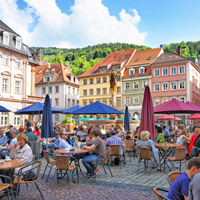Tips for Expats Driving in Munich
Summary: Driving in a new country can be daunting. These tips offer insight into what to expect when driving in Munich.
1. Understanding the Driving Culture
Driving in Munich, like most of Germany, is generally a pleasant experience. The roads are well-maintained and the drivers are disciplined. However, it can be a bit challenging for newcomers due to the high speed limits on the Autobahn and the strict adherence to traffic rules. It's important to familiarize yourself with the local driving laws and etiquette.
2. Choosing the Right Car
Germany is known for its car manufacturing, so you'll see a lot of BMWs, Mercedes, and Audis on the road. However, the type of car you choose largely depends on your personal needs and budget. Compact cars are recommended for city driving due to their fuel efficiency and ease of parking. If you plan on exploring the countryside or going on road trips, a larger car or SUV might be more suitable.
3. Parking in Munich
Finding a parking spot in Munich can be challenging, especially in the city center. Most parking spaces are metered and can be quite expensive. There are also parking garages available, but these can also be pricey. It's recommended to use public transportation or bike for daily commuting and save the car for longer trips or special occasions.
4. Driving with an International License
Foreigners can drive in Germany with an international driving permit (IDP) for up to six months. If you plan on staying longer, you'll need to get a German driver's license. Some countries have a reciprocity agreement with Germany, allowing you to simply exchange your home country license for a German one. Others may require you to take a written and practical driving test.
5. Getting a German Driver's License
To get a German driver's license, you'll need to apply at the local driver's license office (Führerscheinstelle). The process involves a vision test, first-aid course, theory test, and practical driving test. If your home country license is not recognized in Germany, you may also need to take driving lessons. The process can be lengthy and costly, so it's best to start as soon as possible.
6. Adhering to Speed Limits
While the Autobahn is famous for its sections without speed limits, not all parts of it are unrestricted. Also, other roads in Munich and throughout Germany do have speed limits, and they are strictly enforced. Be sure to pay attention to speed limit signs and adjust your speed accordingly.
7. Beware of Bicycles
Munich is a bike-friendly city with many dedicated bike lanes. Always check for cyclists before turning or opening your car door when parked. Also, remember that cyclists have the right of way on bike paths.
About the Author
 Joshua Wood, LPC joined Expat Exchange in 2000 and serves as one of its Co-Presidents. He is also one of the Founders of Digital Nomad Exchange. Prior to Expat Exchange, Joshua worked for NBC Cable (MSNBC and CNBC
Primetime). Joshua has a BA from Syracuse and a Master's in Clinical and Counseling Psychology from Fairleigh Dickinson University. Mr. Wood is also a licensed counselor and psychotherapist.
Joshua Wood, LPC joined Expat Exchange in 2000 and serves as one of its Co-Presidents. He is also one of the Founders of Digital Nomad Exchange. Prior to Expat Exchange, Joshua worked for NBC Cable (MSNBC and CNBC
Primetime). Joshua has a BA from Syracuse and a Master's in Clinical and Counseling Psychology from Fairleigh Dickinson University. Mr. Wood is also a licensed counselor and psychotherapist.
Some of Joshua's articles include Pros and Cons of Living in Portugal, 10 Best Places to Live in Ireland and Pros and Cons of Living in Uruguay. Connect with Joshua on LinkedIn.
Additional Information:





